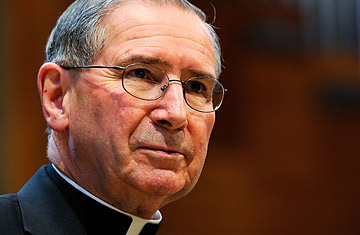
Cardinal Roger Mahony
(2 of 2)
The newest voices in the immigration debate — and those with the potential to shape support for reform — are Evangelical Christians. Earlier this month, the Christian international aid group World Relief and the National Association of Evangelicals co-hosted a forum in New Hampshire for church leaders to learn about immigration from a Biblical perspective. (The sponsoring groups also hoped to put pressure on retiring GOP Senator Judd Gregg of New Hampshire, one of the Republicans faith leaders are lobbying to lend bipartisan support to Senate immigration legislation.)
A new book by two young Evangelicals is taking on concerns within the community about the security aspects of immigration reform. Jenny Hwang and Matt Soerens say they wrote Welcoming the Stranger: Justice, Compassion and Truth in the Immigration Debate to debunk myths some Evangelicals have about immigrants in American society. Willow Creek Community Church, a Chicago-area megachurch, ordered thousands of copies of the book last year for its members. And the pastor's wife, Lynne Hybels, was one of several religious figures who testified last fall in favor of reform before the Senate Judiciary Subcommittee on Immigration, Border Security and Refugees.
Evangelicals are less likely to support comprehensive immigration reform than are members of other religious groups, according to Robert Jones of Public Religion Research. But the changing face of American Evangelicalism is leading many Evangelicals to reconsider their beliefs about immigrants. These days, new Latino immigrants to the U.S. are more likely to be Evangelical than Catholic, and their presence in church can challenge stereotypes held by their fellow worshippers. According to a 2006 Pew Forum on Religion and Public Life survey, white Evangelicals who attend church most often are more likely to support a path to citizenship.
Many religious groups have begun framing the immigration issue as a matter of family values. "These detentions split families when parents are sent back and deported," says Sister Marie Lucey, who lobbies for the Leadership Conference of Women Religious. "It's not true to our values." Rich Nathan, pastor of the Evangelical 10,000-member Vineyard Church in Columbus, Ohio, has emerged as a leader on the issue and cites his own experience with members of his congregation. "We have 75 nations represented within our congregation," says Nathan. "Some of our African members have been unable to return to their homes to be with dying parents or attend funerals because of their undocumented status. As Evangelicals, we have to see the immigration issue as a family issue."
Still, the idea that immigration reform is about protecting family values has yet to trickle down into the most conservative pews. The March Public Religion Research poll found that Republicans were more concerned about using immigration laws to protect national security and ensure fairness to taxpayers than to keep families together. But it also found surprisingly robust support for comprehensive reform, with 63% favoring a path to citizenship over other alternatives.
Despite that broad support for immigration reform and the momentum from Arizona-law backlash, religious leaders fear the cause may suffer from bad timing this year. A rally for immigration reform that drew an estimated 150,000 to Washington in late March ended up unexpectedly competing with the final health reform vote in the House of Representatives held on the same day. The following day, a group of religious leaders that included unlikely allies from the National Association of Evangelicals and the mainline Protestant National Council of Churches met with White House officials to push for swift action and presidential leadership on immigration reform. But the meeting was all but ignored by the press in the aftermath of the health bill's passage.
Now religious leaders worry that financial reform and a Supreme Court nomination battle could occupy too much of the White House's energy and postpone action on immigration reform until after the midterm elections. The hot-button nature of the issue cuts both ways — Democrats would dearly love to further separate Hispanics and other minority voters from the GOP, but they can't afford a backlash of their own from white independents. Still, the faith communities remain optimistic that the reaction to Arizona's new law could fuel a sense of urgency. And if all else fails, they still believe in miracles.
This article has been corrected to reflect the results of the March 2010 Public Religion Research poll. Overall, 8 in 10 Americans say keeping families together is an important value to guide immigration reform. That figure drops 10 points among Republicans, who are much more likely (91%) to say that promoting national security and enforcing the rule of law should be guiding values.
